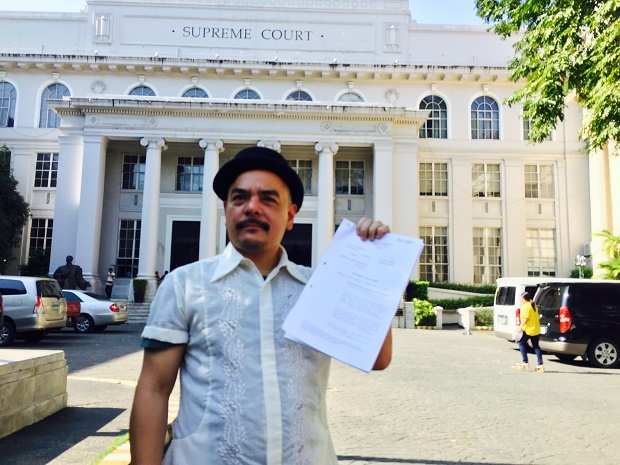
Cultural activist and tour guide Carlos Celdran appears before the Supreme Court on Friday, October 23, 2015 to appeal his conviction over a 2010 protest at the Manila Cathedral. YUJI VINCENT GONZALES/INQUIRER.NET FILE PHOTO
The Office of the Solicitor General (OSG) on Tuesday sought the acquittal of Reproductive Health advocate Carlos Celdran who was found guilty of the crime of Offending Religious Feelings for his infamous “Damaso” stunt in 2010.
In a manifestation filed with the Supreme Court, Solicitor General Florin Hilbay also asked the high court to declare as unconstitutional Article 133 of the Revised Penal Code, the offense Celdran was convicted of.
During an ecumenical service in 2010 at the Manila Cathedral attended by Cardinal Gaudencio Rosales, the Papal Nuncio, former Philippine Ambassador to Rome Henrietta De Villa, and leaders of different Christian denominations, Celdran pulled out his “Padre Damaso stunt in protest against the Church’s position on the Reproductive Health Bill, now a law.
He was convicted by the Metropolitan Trial Court (MeTC) and meted out the penalty of two months and 21 days to one year and one month imprisonment. The MeTC decision was affirmed by the Regional Trial Court as well as the Court of Appeals, prompting him to take his case to the Supreme Court. The high court required the Solicitor General to comment on Celdran’s case.
READ: ‘Confident’ Carlos Celdran appeals conviction over ‘Damaso’ act before SC
The Solicitor-General, in seeking Celdran’s acquittal, said his “act is a protected speech” and the application of Article 133 to him is unconstitutional.
“Mr. Celdran’s display of the word ‘Damaso’ was made in the context of the debate over the Reproductive Health (RH) Bill then pending in Congress. Even the RTC made such a finding, and emphasized that Mr. Celdran shouted ‘Don’t meddle in politics’ while he was being brought out of the Manila….This only shows that Mr. Celdran’s act is a political speech, as it was both intended and received as a contribution to public deliberation about some issue,” Hilbay said.
READ: Unfazed, convicted activist Carlos Celdran to go to SC
Hilbay said Article 133, or the offense which Celdran was convicted of, prohibits speech that are notoriously offensive to the feelings of the faithful which must be directed against a religious practice, dogma or ritual.
However, Hilbay said during the trial, none of the witnesses for the prosecution were able to identify any religious dogma, ritual or belief that they felt ridiculed or insulted.
“In fact, the records show that Mr. Celdran’s act does not rise to the level of a notorious offense,” he added.
The very offense itself, according to the Solicitor General, is unconstitutional on its face.
“Article 133 violates the due process-based proscription against vagueness because it provides no objective standards that allow a person to know whether she/he is committing the crime. An identical utterance would be safe before a tolerant crowd, but deemed criminal before an intolerant audience,” he said.
The Solicitor General added that “Article 133 is void for vagueness. The operative clause of Article 133 punishing acts “notoriously offensive to the feelings of the faithful is unambiguously vague.” RAM/rga